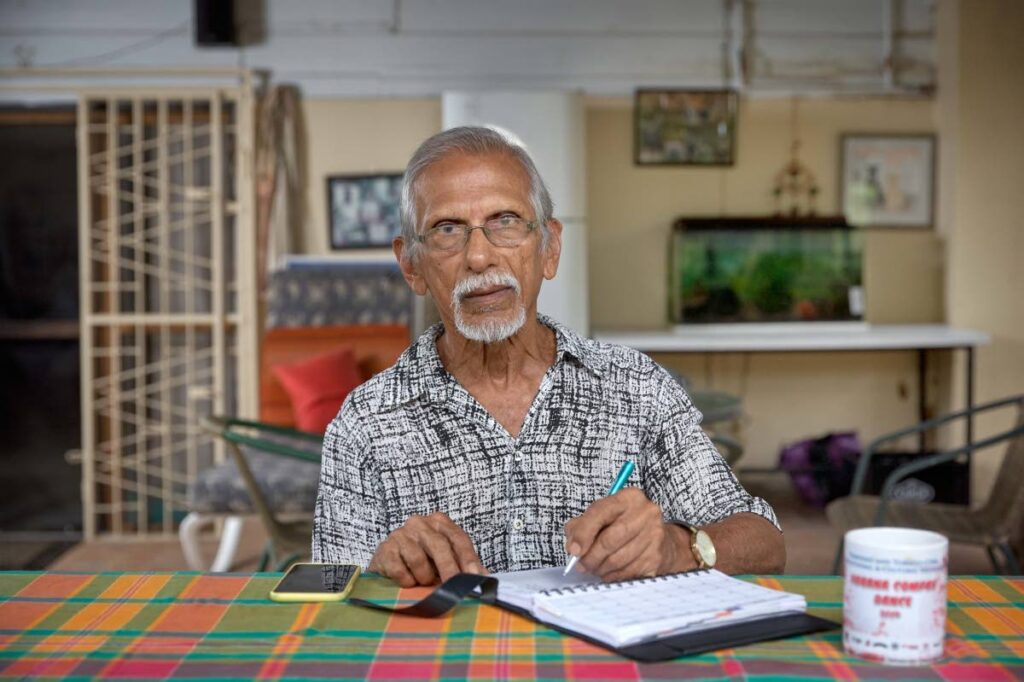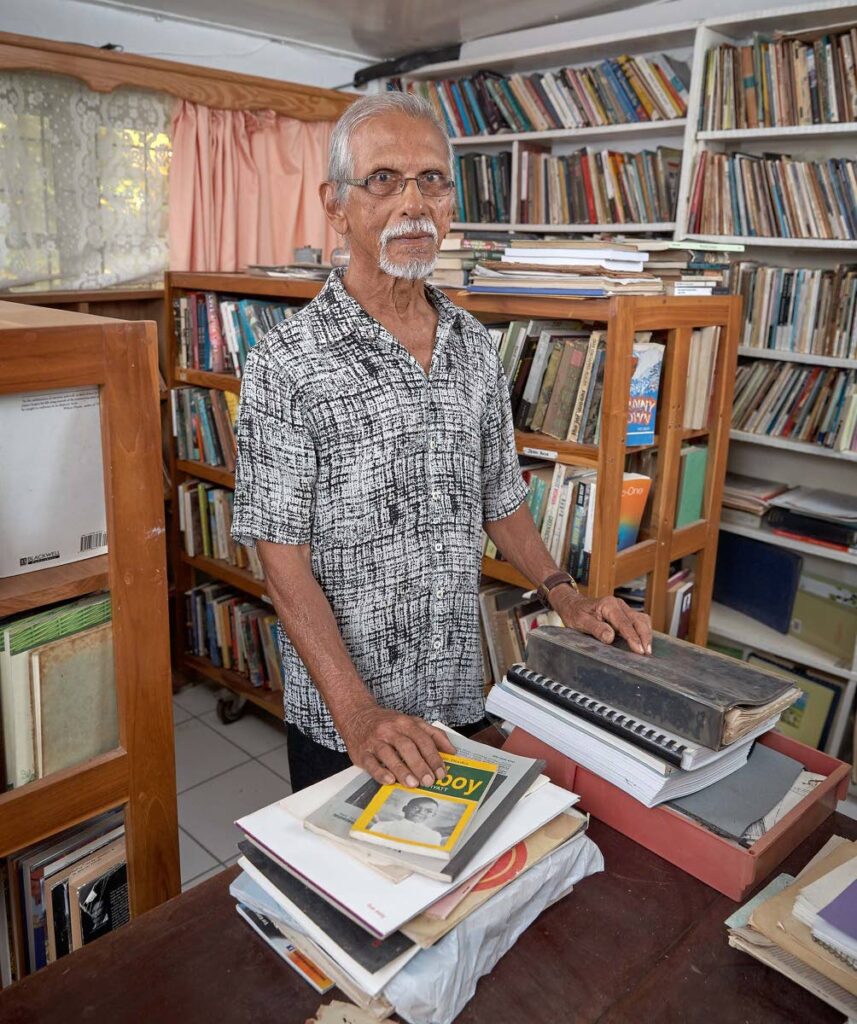A house for Prof Ramchand

AS TOLD TO BC PIRES
My name is Kenneth Ramchand and I am a real literary critic.
I was born in Edward Street, Bonasse Village, Cedros, and lived there continuously till I was 12 years old.
The house adjoined Thomas Chung’s grocery and rumshop, which faced the main road and the sea. Which, at full tide, regularly crashed against the seawall, sending arcs of seawater over the main road into the rumshop, where my father and the other drinkards kept their feet dry by riding on the rungs that stabilised the legs of tall bar stools.
From the gallery of the house we owned until my mother’s illness, we could look to the right of the rumshop on to the seawall and beyond, to the crane on the jetty where boats and barges lurked. The north wind blowing through the house made us feel cold at night.
My home is now in St Joseph-Maracas, where I took up residence in 1975 when I returned to Trinidad and began working at UWI.
When I found out the house was gone, I haunted the street for years, hoping the new owners would sell it back to me.
I settled for a place in Icacos, a village now overrun by illegal immigrants. I go there for the sunsets, the sea, the Great Icacos Lagoon and the once-simple folk at peace with fish, coconut and market gardening.
The old village life is about to disappear, but Bonasse is where I come from and Icacos is my adopted village.
My wife Averil Helen, née Mackintosh, and I have had generations of dogs and two children: Gillian, a linguistic scientist who left a lectureship at Oxford to become a professor at Tromso in Norway; and Michael, a computer whiz with Oracle, who shakes his head and walks me through the complexities of the electronic media.
I met Averil at the University of Edinburgh over 50 years ago.
Our present dogs are Bella and Chloe, whose love story needs to be told.
My primary education began in a private school in the home of Miss Jerome and her daughter Miss Jerome. A decision was taken to back me to win a government exhibition, without which there could be no (secondary) education for me. So I was sent to Point Fortin Intermediate RC School.
At Naparima College I became a multi-disciplinary person, a keen sportsman and a dormitory survivor. Naparima continued the hard Point Fortin process, where I learnt to be me and to focus on my goal irregardless.
Graduate and undergraduate tertiary education was at my beloved Edinburgh University, where I began teaching English literature to white people.
Half (our parents’ children) were christened Anglican for my father, a Presbyterian, and half RC (where) my mother started.
She was, though, thick with Anglican officials and Presbyterian reverends. She made me pray in all the Christian churches and even brought in an obeahman to bless the room in which I slept and studied when I was at home.
We never went to mosque or temple.
I am a passionate believer. I believe I am a fragment of the universe. And I have a sense of the sacredness of nature and human life. I try to follow reason and emotion and to make them work together.
If (anyone alleges) there is one true way to
anything
I will contradict it for spite.
I live in the valley of the shadow of death with the consolation that nothing is final, everything is provisional.
And yet I have moments of happiness and loves that make my living fearless and positive, and joyful enough for a human being.
My favourite colours are the interpenetrating golds and yellows in an Icacos sunset.
I’m a strong, strong fan of Twain, Melville and Faulkner. At Edinburgh I taught a perversely popular Conrad-Faulkner seminar.
While I am working and when I’m in vacant or in pensive mood, I listen to music. Mozart, Vivaldi, The Beatles, David Rudder.
I (could never) dance except when I was young. And wanted to make love to the girl.
My favourite movies include 2001: A Space Odyssey; Groundhog Day; The Godfather; The Searchers; The Apu Trilogy; all movies directed by Clint Eastwood.
And, for mindlessness, all James Bond and Clint Eastwood. I’ll watch Westerns and James Bonds at home.
I wish there was a film club with its own cinema with food and drink banned.
I’ve turned off Carnival – though I love the imagination of Minshall, the genius of Boogsie, selected Joker, early Sparrow, Etienne Charles and all Rudder.
I am a fanatical armchair sportsman and follow: all Test cricket and the last five overs of any T/20 innings; Premier League, La Liga and all Europa competitions. Women’s cricket and soccer, all top-level tennis, all running distances.

Rugby too brutal and basketball too up-and-down for me, but I love to see them taking shots without knowing the score.
A kind of ball ho, really.
I had a sound colonial education. It made me into a reader of books and a man with questions. It gave me the equipment to turn it upside down and take what I wanted from it. I take pride in being well read from small.
I was the village comic-book ho, always borrowing from older boys and always reading the Guardian comics.
The comic books of my early childhood made me a reader and taught me about interior monologues or things that were unspoken but operative. I gobbled up Sad Sack, Superman, The mighty Thor and the Guardian comics, Mandrake the Magician, Dick Tracy, Li’l Abner, The Katzenjammer Kids, The Heart of Juliet Jones.
Even the insipid Rex Morgan MD and all, every one.
I owe my beginnings as a reader to comic books, but now I read fiction, poetry, biographies, no comics or graphic novels. I was already so hooked on reading the real stuff I just didn’t have the time for hybrids again.
Favourite books include the Bible, Palace of the Peacock, The Mayor of Casterbridge, Great Expectations, The Old Man and the Sea.
I enjoy James Salter, Cormac McCarthy and John Williams, author of Stoner (1965), one of the best books I’ve read, but my favourite writer is William Shakespeare.
I follow the one or two authentic new regional writers and Indian writers in English.
And take guidance on what new American, British and European, Japanese and Russians to read.
Life is too short for Proust. I take pleasure in Dubliners and Portrait of the Artist and can enjoy snippets of Ulysses.
But a writer has to be Blake or Wilson Harris to deserve my time (a finite asset).
We can approach (defining a
real
literary critic) by noting a cluster of book-related activities: reviewing; writings connected with the teaching of literature; commentary on literary texts; scholarly research; and theories about literature. Real literary criticism takes these into account when (necessary).
The begetter of all of these is reading.
I am a real literary critic because my work, inspired by reading literature, encourages people to lose themselves in the world of the book. And, if they are deserving, to return with deeper understandings of themselves, other people, their society, the world and the universe of which they are particles.
There are fake literary critics practising in the academy who are locked into reading one another’s theories of literature instead of works of literature. No respect for the artist and the artistic process. They detach the dancer from the dance; they have no interest in what language is creating through the chosen vessel that is the writer. They cannot surrender, cannot lose themselves in the act of reading. They are like people who prevent themselves from having orgasms.
Real literary criticism is a sacred and demanding calling. It requires first of all trying to be Walcott’s greatest reader in the world.
If a character in a book is a serial killer of old ladies you have to feel like the serial killer and the old ladies at the same time. If you lose your “known” self in the selves of Donne and the crew living and dying over centuries of seeking the Palace of the Peacock, you feel remorse about your riven society.
It can take days to recover and start to collect oneself from the experience of reading.
Not too sure what Trinis are these days or if it matters to them, but the creature begins to take its distinctive shape from having been born here. Or having arrived here in early childhood; or after living here for many years during a formative period.
The Trinidadian is a various creature flavoured by the meeting of peoples and cultures in a small place.
I don’t have the same relationship to Tobago that I have with Trinidad. My Trinidad is my core experience and source. It generates energy in me as its diverse elements fuse in a memory of oneness and then fly apart in vivid separateness. It never settles into being a fixed thing that can be taken for granted.
It gives me no peace, because it is always renewing itself, even, I suspect, as I sleep.
It is of course a very real and physical place with sorrows and joys, a landscape to which my body is attuned, but it is also a timeless country in head and blood. It is the universe.
Read the full version of this feature on Friday evening at www.BCPires.com


Comments
"A house for Prof Ramchand"